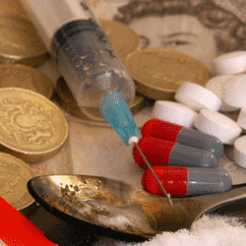Surely one of the most controversial stories of the month is the opening of a helpline for UK drug addicts by US based charity ‘Project Prevention’?
This charity offers cash incentives to female drug addicts who undergo sterilisation in order to prevent them bearing children they will not care for.
The charity themselves admit that the money it pays addicts will normally go to paying for more drugs – but claims that this is an efficient way of protecting the rights of the unborn children. Those rights, it claims, over-ride those of the addicts.
This is wrong in so many ways I hardly know where to begin; How can it be acceptable to write off all addicts as lost causes and take away their chances of ever having a family? How can charitable money be used to fund the purchase of drugs? How can incentivising desperate people - whose only thought at that point in time is how to get their next fix – to take actions of such significance be responsible?
Surely there is also a fundamental flaw in the rationale that the charity founders state underpins their actions - how can you base your rationale on the rights of a unborn child when the only help you offer that child is not to be born at all?
At one time in my career I worked in a charity helping adults with learning disabilities. I remember receiving a large donation from a supporter who gave this money on the condition that we used it to sterilise adults with Down’s Syndrome to prevent them having children they could not care for. Although the donor was well meaning, there was no way the charity would entertain the idea of accepting the money for this purpose and we entered into a candid conversation with the donor about why such action would never be something we would consider. Happily in this instance the donor did reconsider his view and allow the donation to be used for work to champion the rights of young adults with Down’s Syndrome.
I am not just shocked but also saddened that a charity with objectives and programmes such as those of Project Prevention can be allowed to operate even a phoneline within the UK. I am even more saddened that this organisation will be welcoming donations from UK residents. Drug addiction and children’s rights are emotive topics and as a sector we need to ensure that we educate the public about what kinds of responses are appropriate.
Sterilisation in my opinion is not a suitable response to drug addiction, any more than it is to learning disability. Project Prevention will just muddy the waters and allow greater confusion in the minds of donors. It could also draw vitally needed funding away from charities who are doing such valuable work helping addicts and their families deal with their addiction and make positive changes in their lives.









